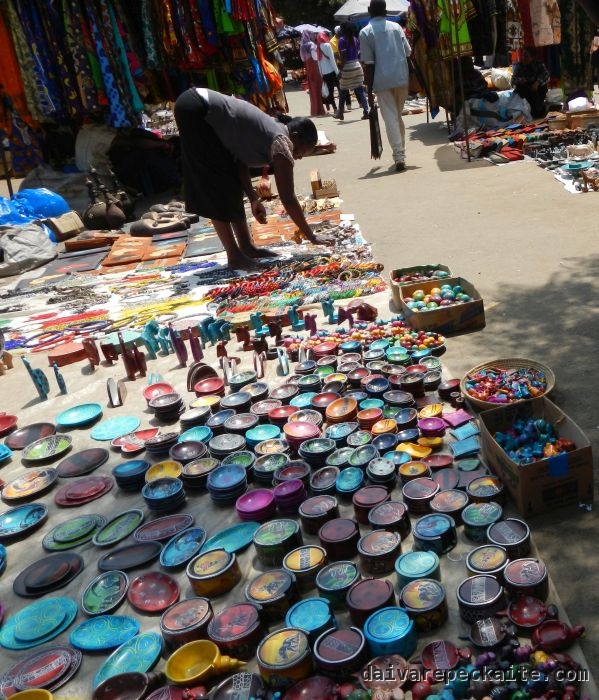On a minivan from Maasai Mara, I thought my pockets were already stuffed with beadwork and souvenirs, so there was no way I would acquire more. When a trader lifted his arms, with bracelets and necklaces hanging from them, towards my window as we briefly stopped by an ATM somewhere close to Narok, I told him I was not interested and continued writing my diary. “Do you have a spare pen?” he asked. Indeed, I did. “Are you interested in trading it for something?” I asked to confirm, and thus started one of my favorite adventures in Kenya.
Before the trip, a friend of my travel companion informed us that pens were on demand in East Africa. He suggested that, against the habit of many tourists in the region to give people sweets, we could consider bringing a few pens as gifts to poorer families and children. So I packed four pens and two pencils for the trip. However, meeting this beadwork trader brought an end of my philanthropic aspirations. In subsequent travels and walks, in marketplaces and on the beach in Mombasa, I traded anything imaginable – a conference pullover, two old T-shirts, my old sneakers and flipflops, nearly finished sunscreen and mosquito repellent, socks and souvenirs I brought from home and didn′t use. In exchange, I received souvenirs, handmade postcards, a canvas painting, a very nice beach bag (I had to add some extra cash for this), and other things. On the last day in Mombasa, I traded my old swimsuit for chair rent and two coconuts.
Obviously, even when I left many things for a tiny souvenir, I felt the deals were profitable for me. I packed my bags so that I could leave many things behind (as I thought, for some poor people to use). Yet it turned out that second-hand clothing and household items are on high demand in Kenya, so my old stuff found new homes through barter exchange. People asked if we had cameras, more pens, paracetamol and even condoms. Of all things I traded, I received most of them for free – as a journalist and former academic, I never have to buy pens. The question is, were the deals just as profitable for those traders?
I could totally picture them joking to their family and friends, reversing the old colonialist trope, “White people are so primitive – they are ready to strip down for a bunch of beads.” At the same time, it is somewhat sad to think that used pens or second-hand clothes can so easily be deemed of equal value to local arts and crafts. Can we speak of equal exchange in an unequal North-South constellation of power? When I was younger, I used to love crafts markets, and I spent quite a bit of cash on such things in Europe and Israel. It never occurred to me to suggest these craftspeople to trade their work for my old sneakers.
Yet the truth is, I would have never considered acquiring so much craft work from Kenya otherwise. Tourism economy incentivizes people to specialize in producing and selling nearly identical, low-value things for tourists – mini plates, souvenir sculptures, bracelets, masks, necklaces, key rings and similar curia rather than usable items for households. I had similar reflections in Croatia. I wish I could have brought back something from Kenya′s productive industries instead. I could see that locals were very skilled at producing custom-made furniture, but this is not something that a budget traveler with a small backpack could bring home. Markets were full of clothes, including beautiful shirts with colorful patterns, but when I looked at the labels, one of them said ‘Chiang Mai’, and one shirt had a label cut in half, just enough for me to see “Made in Th…” I thought that coffee would be an obvious gift item, but most of coffee is grown for export, and what remains in local stores tastes notoriously bad.
It is also a fact that stuff is reused here until it literally falls to pieces. From Japanese cars to Swedish baby clothing, second-hand items from rich countries easily find their second home in Kenya. Skilled workers, often called doctors, repair shoes, clothing, TV and video equipment, and various other things to prolong their life. This is something to learn from locals and to be aware of.


